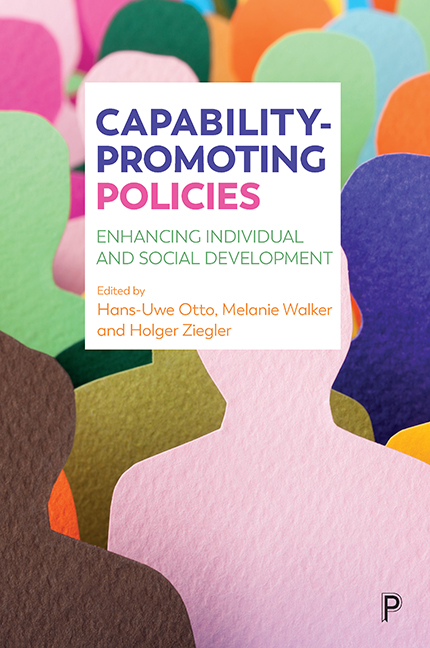Sixteen - What is to be done about capability-promoting policies?
Published online by Cambridge University Press: 12 April 2022
Summary
While the capabilities approach is a convincing conception that attempts to theoretically reconcile allegedly competing demands associated with the fundamental principles of equality, recognition, welfare, liberty and human dignity, there is still surprisingly little research on capabilitypromoting policies in real-life contexts. The aspiration of this book has been to contribute to closing this gap. Some of the contributions have thus examined how a human development approach has been operationalised and these chapters assess the possibilities, obstacles and dilemmas of this approach when put into practice. In doing so, the contributions in this volume clearly demonstrate that the perspective of the capabilities approach makes a difference and opens up viable alternatives: the concept of capability-promoting policies is not only a political philosophical concept, but also a feasible and meaningful approach to analysing policy limitations – as some of the chapters do – and conceptualising real-world policies.
The chapters in this volume therefore have demonstrated how the capabilities approach provides a politically normative metric to critically assess given policies and public policy structures, as well as to analyse policy interventions driven by human development or human security concerns. By and large, they show that the realisation of capabilities or the feasibility of human flourishing are largely the result of existing social structures and institutions. Very often the effects of these structures are unnecessary and rather less secure than may appear – in the specific sense that significant changes in policy may alter these structures or at least largely moderate their effects. The point is that the policies of public institutions are often critical in ensuring or impeding people's chances to convert abstract and formal opportunities into genuine capabilities in the sense of ‘real’ and effective powers and freedoms.
Policies do obviously differ with respect to their contribution to human flourishing, and policies may contribute to restrict or to expand the opportunities individuals and groups have to realise lives they have reason to value. Drawing on empirical evidence and experiences in diverse contexts, a number of contributions show that some policies are more socially balanced, more inclusive and more successful in combating disadvantage and reducing – or at least in not (re) producing – social and human suffering than others. They thus point to comparatively more capability-friendly policies, and comparatively more rather than fewer equitable policies.
- Type
- Chapter
- Information
- Capability-Promoting PoliciesEnhancing Individual and Social Development, pp. 301 - 306Publisher: Bristol University PressPrint publication year: 2017

